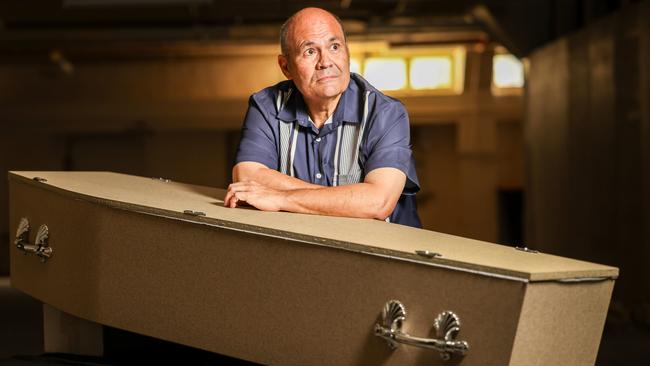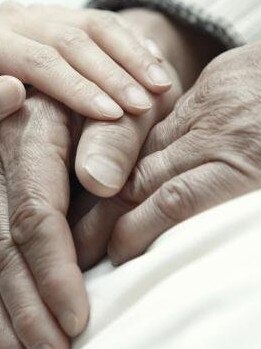Meet Adelaide’s Master of Death: The man unlocking life’s greatest mystery
It’s the great unknown, the big taboo, the unfathomable mystery, the one thing many of us choose to ignore and sweep under the carpet ...

SA Weekend
Don't miss out on the headlines from SA Weekend. Followed categories will be added to My News.
Mark Simpson was forced to confront death head-on when he and wife Julie lost their teenage son, Ben, to suicide in 2005.
As expected, there was a period of shock and devastation and an inability to understand what had just happened.
However, after a little while, Simpson decided he needed to get on the front foot.
He wanted to understand death a little better.
He wanted to break it down and demystify it.
He set out to try and know, even just a little bit, what many would deem unknowable.
Already owning medical qualifications, he undertook a course which led to a Master of Science in Thanatology – the study of death from many perspectives including the physical, spiritual, ethical, psychological and medical.
“So what did I get from having a Masters Degree in this?” he asks rhetorically.
“I gained an encyclopedia of answers.
“While I’ve tried to demystify it, people still need someone with some expertise to answer their questions.”
From there he launched the Death & Dying series of courses at the WEA, which started in 2015, and grew exponentially in popularity every year thereafter.
“I was having talks with the WEA about what sort of courses would attract interest and it was an off the cuff comment where I said anything that has the word death in it will create interest,” Simpson explains.
“And right on cue, they were interested.
“Be that as a morbid curiosity or just a need to know more, people will turn up if you’re discussing death.”

His first part of trying to crack the code was looking at how we, in Australia, view death.
“The civilisations that include death in their culture well, they honour the death by celebrating the life lived,” he says.
“We don’t have death as a part of our culture. It’s a separate thing with our culture and the process of losing someone to death is extremely distressing.
“People in our culture have this tendency to think that if they talk about death and dying, they may jinx it and it will happen. So, we go on ignorantly until a death happens.
“I wanted to address that, but I also had to make it palatable and interesting to prospective students.”
Simpson started the course by presenting death and dying in an historical perspective – to great effect.

To get people in and to lighten the subject somewhat, he decided to include anything “weird and wonderful” to do with death. The students lapped it up and the courses filled quickly.
“Most of the early courses accommodated that morbid curiosity but they laid the foundation for more courses,” he recalls.
“I went back into history and talked about the morbid ways people died or were executed in the past.
“I looked at everything from the guillotine to hang, draw and quartering, and the Black Plague.
“Those attending the courses were usually horrified or disgusted but always wanted to know more.
“It was a way of breaking down the awkward silence around death and getting them to talk.”


Few people know more about death, or the value of talking about it, than Professor Jennifer Tieman, the inaugural director of the Research Centre in Palliative Care, Death and Dying at Flinders University.
Her work, and that of her colleagues, has helped change the way we think about and approach the subject.
The CareSearch online resource, for instance, now attracts more than 25,000 visitors a month – health professionals, caregivers, patients and families, and interested members of the public – to educate them about palliative care (alongside a string of apps and training courses) and to prepare them for the inevitable.
As it has grown, its remit has expanded, from helping to develop professional expertise in the field, to actually also looking at how the community perceives, understands, engages with and discusses death and dying and grief.
As such, Tieman agrees it is both healthy and important to talk openly and honestly about death.
“We need to understand that humans are mortal, and that death is actually a part of life,” she says.
“(And) if we don’t have those conversations, we may not be prepared for what will be happening in our own lives, but also we’re not prepared to support the community members who are actually living with these realities.”
It’s also a little less taboo these days, she says, which is an interesting byproduct of Covid, when people were forced to confront their mortality and that of loved ones.
“People realised that they could die from Covid, even though the rates in Australia were very low compared to other countries realistically,” she says.
“But they have suffered the issues of lockdowns, and needing to find ways of protection and then isolation.
“And in those contexts, we had families who were actually living with the reality of dying.
The other circuit breaker is our ageing population.
“Both the aged care and the healthcare system have been under growing pressure for a number of years due to the ageing population. Given the proportion of people over 75, many families are living with choices about care for older family members and deterioration and eventual death and these were exacerbated by Covid,” she says
“It was almost a perfect storm of people actually having to deal with realities about the end of life.”

So, in short, coupled with the fact we are all living longer, people are increasingly forced to confront death, have open discussions and make plans on a subject they may previously have swept under the carpet. This, Tieman says again, is a very good thing.
It also helps individuals to think about and consider fundamental questions, such as “what will happen to my partner? How will these things be managed? What are the practical things that need to be done to ensure that I’ve taken care of the people I’m leaving behind”.
“And it starts to remove fear around it, because you actually can talk about something tangible,” she says.
“Often what’s unknown is the scariest thing. Now, you’re not going to know what it feels like to die but you can actually know what other people think about it.
“And you can share concerns or issues or what you know, or what experiences you have had.
“That then helps you to articulate what you think you would want for yourself, and people then can go into advanced care planning and formal documentation.”
It’s equally important to talk to children about death; the key is finding the right time and the right conversation, for the right age.
“One of the times may be if you’ve seen a movie together, you might talk about it,” she says.
“Speaking generically, there’s lots of opportunities as we see death portrayed in a lot of different media. That’s a chance to say ‘How did you feel about that?’ And to ask them what they think and to share their own feelings and opinions around it.
“Or you may talk about family friends who have lost a grandparent. This is the chance to let them know that it’s OK to feel sad and hurt. You can also reassure them that there will always be friends and family who will care for them.”
It’s also important to start these conversations young, she says.
“There’s a lot of material around how to start talking to children, (for instance) around seasons, around the fact that things are born and then they die. This can all happen over a period of time; it’s not about just having one conversation, it’s an ongoing discussion about such things being a part of life.”
As someone who deals with death daily, how has Tieman come to view it?
“Death can make you appreciate life in a different way; many people waste their life not really valuing it. For me, it’s incredibly important to experience life every day,” she says.
“I think talking about death enables you to recognise time is important. People who are living with a terminal illness talk about the memories and sharing, and the moments that matter. So, I think learning to value the time you have is an insight that working in the field has given me.”

As Simpson’s courses have grown in popularity, they’ve evolved. Now they even take a close look at the funeral industry – from the obligations families feel to honour their loved ones, to the exorbitant, often unexpected costs, they face.
“After discussing the horrible ways earlier so-called civilised cultures brought death upon people as punishment, I eventually offered courses dealing with the funeral industry,” he says.
“I talked about what a lucrative industry it is.
“I addressed the fact that people were paying very large amounts for funerals because they were at this time of grief and there’s a guilt attached to not putting your hand in your pocket or in cutting corners.
“People generally feel they need to give their loved one a good send off without fully considering the costs – if you consider costs, well, you’re supposedly disrespecting your loved one.
“You’re not, of course, but that gives the industry a pretty good premise to work on.
He then put together a course on planning funerals “because people don’t talk about it around the dinner table until there’s a death”.
“This course gives people an awareness of what to expect, of the costs involved whether they are planning a funeral now or into the future.“It’s all very well to think that grandpa said he didn’t want any fuss, just to have his ashes scattered under a fruit tree. But how do you interpret that and feel you’ve honoured him?”
Just as one course has led to another variation since Simpson started with the WEA, the Death & Dying series is taking yet another turn, with the introduction of the When Death and Dying is Interrupted course, looking at the phenomenon of what people experience in near-death experiences and what that means when improved medicine brings more people back from the brink.
So what has immersing himself in this subject taught Mark Simpson about death?
For starters, it’s a normal part of the human experience. It’s a natural part of life. It’s often difficult and challenging and heartbreaking. Equally, it’s healthy to talk about it. To accept it. To understand it. And to bring it out into the open. ■


